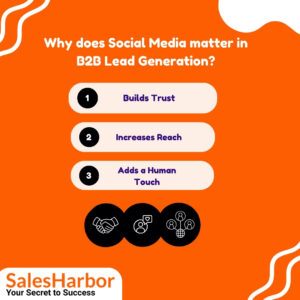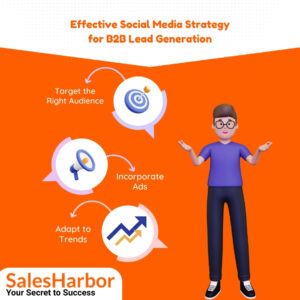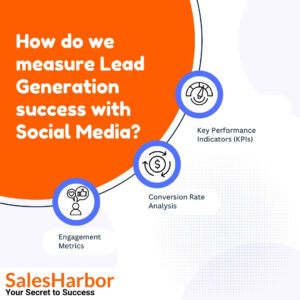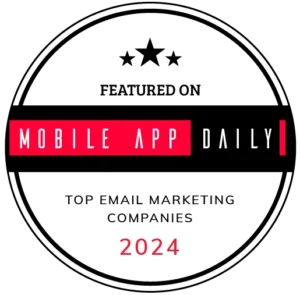Do you find yourself wondering about the changing landscape of businesses and its impact on B2B Lead Generation? Well, you’re not alone. Many around the globe are interested in knowing more about its impact on B2B lead generation.
To ensure you’re on track and keeping up with the pace, it’s necessary to equip yourself with the information available about this dynamic niche.
So let’s dive into the basics.
Why does Social Media matter in B2B Lead Generation?
1. Builds Trust
Generating a potential lead becomes slightly less challenging when the content your company is creating has value and relevance. Companies tend to trust a recognizable and familiar brand image relatively more.
An average of sixty-six percent of people said the presence of social proof increased their likelihood of purchasing a product/service.
Source: Trustpilot
2. Increases Reach
In the B2B arena, where relationships matter, a broader social media reach means more eyes on your expertise. Decision-makers are scrolling, and you want your content in their feed.
It’s not just visibility, it’s an invitation to be part of their consideration list when they’re ready to make a move.
3. Adds a Human Touch
In the AI-driven realm of content, adding a human touch to social media isn’t just cool, it’s a power move.
As algorithms curate our feeds, the significance of building real connections is increasing. Businesses are more likely to reach out when it’s a human behind the screen.

How can you curate an effective Social Media strategy for B2B Lead Generation?
1. Target the Right Audience
Creating a standout B2B social media strategy depends on precise audience targeting. Start by identifying your ideal clients, and gaining insights into their challenges, and preferences.
A crucial element in this strategy involves fine-tuning the content to resonate with the masses. It’s not just about broadcasting messages, it’s about crafting a narrative that aligns with what your audience seeks.
2. Adapt to Trends
Adapting to trends is your strategy’s secret weapon. Whether it’s embracing fresh content formats, or aligning with the industry’s buzz, being adaptable is the key. It is important to look at trends as windows of opportunity.
Share your perspective on hot topics, and don’t be afraid to initiate discussions. By being at the forefront of these trends, you’ll have a higher chance to position your brand as an industry leader and land strong leads.
3. Incorporate Ads
Including advertisements in your B2B social media strategy is a smart way to generate leads. Create ads complementing organic content and offering value while subtly nudging viewers to become potential leads.
Utilise the A/B test to maximise performance and adjust your strategy according to audience response. By distributing your resources wisely, you can make your social media strategy a focused powerhouse.

Recommended articles related to B2B Lead Generation Trends:
Emerging Trends in B2B Lead Generation: What You Need to Know
The Power of Personalization in B2B Lead Generation
What ROI does Social Media platforms bring for B2B Lead Generation?
1. LinkedIn
LinkedIn can be an ROI catalyst if used wisely. With direct access to decision-makers, targeted content, and impactful LinkedIn Ads, it’s a meticulous tool.
Convert connections into opportunities, and seamlessly gain leads. In B2B,
LinkedIn’s effectiveness is unparalleled, delivering tangible ROI through engagement and networking.
2. X (formerly Twitter)
X is a B2B powerhouse that makes it easy to engage immediately and get in touch with influential people in the business. Write concise, powerful posts and use X Ads to target specific audiences. Its re-post culture greatly increases the reach of your work by boosting it to new audiences and a stronger return on investment.
3. Instagram
Instagram enhances brand storytelling through eye-catching images and engaging experiences, it’s a visual haven for B2B users. Utilize Instagram Ads to gain focused exposure. With the correct sales funnel, it’s more than simply likes. It’s a visual story that turns interactions into possible leads.
4. Facebook
Facebook, an established player in social media platforms has an advantage with its powerful Groups feature. To encourage community involvement and dialogue, you can start or join groups tailored to your niche.
The Ads feature also allows businesses to target customers precisely by demographic data. This element guarantees that your advertisements are viewed by those who have previously interacted with your business, raising the possibility that clicks will result in leads.
5. YouTube
YouTube’s large global audience allows B2B marketers to reach a wide range of demographics and increase their market presence. Businesses can easily use YouTube Ads to carefully target particular industries. However, the content creation can be more time-consuming on this platform.
As a centre for education, the platform gives B2B marketers the tools they need to convert viewers into leads.

How do we measure Lead Generation success with Social Media?
1. Key Performance Indicators (KPIs)
KPIs are essential for evaluating and refining social media-driven lead-generation tactics since they provide a simplified method and real-time insights. They also enable companies to make strategic adjustments, manage resources wisely, and make sure their social media initiatives are not just active but also producing leads.
2. Conversation Rate Analysis
The Conversation Rate Analysis plays an important in understanding the effectiveness of the social media strategies your company or brand has been implementing. It can be calculated by dividing the number of conversions by the total amount of clicks. Furthermore, it can pinpoint high-performing content or campaigns.
3. Engagement Metrics
Engagement metrics provide real-time insight into audience interest and interaction. Additionally, monitoring the duration and context of interactions offers a detailed comprehension of the audience’s behaviour as well. If analysed well, these metrics can unveil content with the potential to go viral organically.

Conclusion
In a nutshell, social media trends and marketing play a vital role in finding organic B2B leads. But to succeed, one has to understand this rapidly evolving industry well.
As much as AI has altered the digital marketing realm, the value of authentic and personalized content is still high. Adding a face to your company or brand will inevitably increase its chances of having a high conversion rate.
As far as numerous social media platforms are concerned, one has to understand that each of them has its unique selling point and work accordingly. Its success solely depends on the industry your company is functioning in.
Yielding results through publishing ads on these platforms can become easier if you know your demographic. Investing in primary and secondary market research is indeed necessary before you hunt for B2B leads for your company. This will not only help you create relevant content but also give your ads a sense of direction.
Forbes has also written an article on the role of social media marketing. Read here.
Subscribe to our newsletter for more valuable content.



